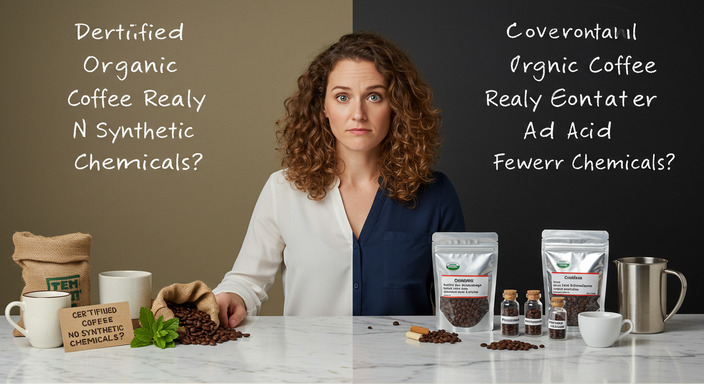
Is Organic Coffee Healthier Than Conventional?

Table of Contents
ToggleWhat Makes Coffee Organic?
Definition of Organic Coffee
Organic coffee refers to coffee that is grown and processed following strict guidelines that prioritize environmental sustainability and health-conscious practices. Unlike conventional coffee, organic coffee is cultivated without the use of synthetic pesticides, herbicides, or chemical fertilizers. Instead, it relies on natural methods to maintain soil health and control pests, ensuring a cleaner, more eco-friendly product.
Certification Standards and Regulations
For coffee to be labeled as organic, it must meet specific certification standards set by organizations such as the USDA (United States Department of Agriculture) or other internationally recognized bodies. These standards include:
- Using organic seeds and natural farming techniques.
- Maintaining soil fertility through composting and crop rotation.
- Avoiding synthetic chemicals throughout the entire production process.
Farmers must undergo regular inspections and adhere to these rigorous guidelines to retain their organic certification. This ensures that the coffee you drink is genuinely organic and aligns with sustainable practices.
Differences in Farming Practices
The farming methods used for organic coffee differ significantly from conventional coffee farming. Here’s how:
| Aspect | Organic Coffee | Conventional Coffee |
|---|---|---|
| Pesticides | Natural pest control, like introducing beneficial insects. | Relies on synthetic pesticides that can harm the environment. |
| Soil Health | Maintained through composting and organic fertilizers. | Often depleted due to chemical overuse. |
| Biodiversity | Promotes diverse ecosystems and shade-grown methods. | Monoculture practices reduce biodiversity. |
These practices not only benefit the environment but also contribute to the rich, nuanced flavors that many coffee lovers appreciate in organic varieties.
Health Benefits of Organic Coffee
Reduced Exposure to Pesticides and Chemicals
One of the most compelling reasons to choose organic coffee is the reduced exposure to harmful pesticides and chemicals. Conventional coffee farming often relies on synthetic pesticides and herbicides, which can leave residues on the beans. These chemicals may pose health risks over time, especially with regular consumption. Organic coffee, on the other hand, is grown without synthetic inputs, ensuring a cleaner cup that aligns with a healthier lifestyle.
Higher Nutrient Content and Antioxidants
Organic coffee is often richer in nutrients and antioxidants compared to its conventional counterpart. Studies suggest that organic farming practices, which focus on soil health and natural fertilizers, can enhance the nutritional profile of coffee beans. This means your morning brew may contain higher levels of chlorogenic acid and other antioxidants, which are known to support overall health and reduce inflammation.
- Chlorogenic acid: Helps regulate blood sugar and supports heart health.
- Polyphenols: Combat oxidative stress and promote cellular health.
Potential Impact on Long-Term Health
Choosing organic coffee isn’t just about immediate benefits—it’s an investment in your long-term well-being. By avoiding synthetic chemicals and supporting sustainable farming practices, you’re reducing your exposure to potential toxins that could accumulate in your body over time. Additionally, the higher antioxidant content in organic coffee may contribute to reduced risk of chronic diseases, such as heart disease and diabetes, making it a smart choice for health-conscious individuals.
“Every sip of organic coffee is a step toward a healthier you and a healthier planet.”
Environmental Impact of Organic Coffee
Sustainable Farming Practices
Organic coffee is grown using methods that prioritize the health of the planet. Unlike conventional farming, which often relies on synthetic pesticides and fertilizers, organic coffee production focuses on natural alternatives. Farmers use compost, crop rotation, and natural pest control to maintain the ecosystem’s balance. These practices not only protect the environment but also ensure that the coffee you enjoy is free from harmful chemicals.
Soil Health and Biodiversity Preservation
Healthy soil is the foundation of organic coffee farming. By avoiding synthetic inputs, organic practices enhance soil fertility and structure, allowing it to retain more water and nutrients. This benefits not only the coffee plants but also the surrounding ecosystem. Furthermore, organic farms often preserve natural habitats, encouraging biodiversity. Birds, insects, and other wildlife thrive in these environments, creating a balanced and resilient ecosystem.
Reduced Carbon Footprint
Organic coffee farming typically produces lower greenhouse gas emissions compared to conventional methods. The absence of synthetic fertilizers and pesticides means less energy-intensive production processes. Additionally, organic farms often incorporate agroforestry, where coffee is grown alongside trees and other plants. This not only sequesters carbon but also provides shade and shelter for the coffee plants, reducing the need for external resources.
- No synthetic chemicals means less pollution in waterways and soil.
- Agroforestry practices contribute to carbon sequestration, helping combat climate change.
- Healthy ecosystems support a sustainable future for coffee farming and beyond.
Ethical Considerations in Coffee Production
Fair Trade and Farmer Welfare
When you choose organic coffee, you’re often supporting fair trade practices that prioritize the well-being of farmers. Fair trade ensures that coffee growers receive fair wages, which helps them sustain their livelihoods and invest in their communities. This is especially important in regions where coffee farming is a primary source of income. By opting for fair trade organic coffee, you’re contributing to a system that values human dignity and equitable treatment for all workers involved in the supply chain.
Supporting Small-Scale Farmers
Many organic coffee brands source their beans from small-scale farmers who use traditional, sustainable farming methods. These farmers often lack the resources to compete with large commercial operations, but organic certification and fair trade partnerships give them a fighting chance. By supporting these farmers, you’re helping to preserve biodiversity, protect ecosystems, and promote agricultural practices that are kinder to the planet. Plus, small-scale farmers often produce coffee with unique flavors, adding diversity to your cup.
Transparency in the Supply Chain
One of the hallmarks of ethical coffee production is transparency. Organic coffee brands often provide detailed information about where their beans come from, how they’re grown, and who benefits from the sale. This level of openness allows you to make informed choices about the products you buy. When you see certifications like USDA Organic, Fair Trade, or Rainforest Alliance, you can trust that the coffee has been produced with respect for both people and the environment. Transparency ensures that your purchase aligns with your values, making every sip feel even more rewarding.
Taste and Quality: Organic vs. Conventional
Flavor Profiles and Freshness
When it comes to coffee, flavor is king. Organic coffee often stands out for its richer and more complex flavor profiles. This is largely because organic farming practices prioritize soil health, which enhances the natural nutrients absorbed by coffee plants. Conventional coffee, on the other hand, may rely on synthetic fertilizers and pesticides, which can sometimes result in a more uniform, but less nuanced, taste. Additionally, organic coffee is often fresher, as it is typically grown in smaller batches and processed with greater care to preserve its natural qualities.
Factors Influencing Taste
Several factors contribute to the taste differences between organic and conventional coffee:
- Soil quality: Organic farming practices enrich the soil with natural compost and organic matter, leading to healthier plants and more flavorful beans.
- Growing conditions: Organic coffee is often shade-grown, which allows the beans to mature slowly, developing a deeper flavor.
- Processing methods: Organic coffee is typically processed using traditional methods that avoid harsh chemicals, preserving the beans’ natural characteristics.
Consumer Preferences and Trends
In recent years, there has been a noticeable shift in consumer preferences toward organic coffee. Many coffee enthusiasts appreciate the authentic and sustainable qualities of organic beans. According to recent trends:
- More than 60% of coffee drinkers in the U.S. are willing to pay a premium for organic coffee.
- Consumers are increasingly drawn to brands that prioritize fair trade practices and environmentally friendly production methods.
- The demand for organic coffee is particularly strong among younger generations, who value health-conscious and eco-friendly products.
This growing interest reflects a broader awareness of the benefits of organic coffee, not just for personal health, but for the planet as well.
Is Organic Coffee Worth the Cost?
Price Comparison with Conventional Coffee
When comparing organic coffee to conventional coffee, the price difference is often noticeable. On average, organic coffee can cost 20-30% more than its non-organic counterpart. This price disparity stems from more labor-intensive farming practices, certification costs, and lower yields associated with organic agriculture. However, it’s essential to consider what this extra cost represents: a commitment to healthier farming practices and a cleaner environment.
Long-Term Value for Health and Sustainability
While the upfront cost of organic coffee may be higher, its long-term value for both personal health and environmental sustainability is significant. Organic coffee is grown without synthetic pesticides, herbicides, or fertilizers, which means you’re reducing your exposure to harmful chemicals. Additionally, organic farming promotes soil health, biodiversity, and water conservation, contributing to a more sustainable planet. Over time, investing in organic coffee can be viewed as an investment in your health and the future of the Earth.
Tips for Making an Informed Choice
Choosing organic coffee doesn’t have to break the bank. Here are some tips to help you make a cost-effective and informed decision:
- Buy in bulk: Purchasing larger quantities can reduce the cost per serving.
- Look for sales and discounts: Many retailers offer promotions on organic coffee, making it more affordable.
- Prioritize certifications: Ensure the coffee is certified by reputable organizations like USDA Organic or Fair Trade.
- Support local roasters: Small, local roasters often offer high-quality organic coffee at competitive prices.
By considering these tips, you can enjoy the benefits of organic coffee without feeling the financial strain. Remember, your choice not only impacts your health but also supports a more sustainable and ethical coffee industry.
How to Choose the Best Organic Coffee
Choosing the best organic coffee isn’t just about taste—it’s about making a conscious decision that supports your health, the environment, and ethical farming practices. Here’s how to navigate the world of organic coffee with confidence.
Reading Labels and Certifications
When shopping for organic coffee, labels and certifications are your best friends. Look for the USDA Organic seal, which guarantees the coffee is grown without synthetic pesticides, herbicides, or fertilizers. Other certifications like Fair Trade, Rainforest Alliance, or Bird Friendly indicate that the coffee meets additional ethical and environmental standards. These labels ensure your purchase supports sustainable farming and fair wages for farmers.
Trusted Brands and Sources
Not all organic coffee brands are created equal. Some trusted names in the industry include Equal Exchange, Allegro Coffee, and Counter Culture Coffee. These brands are known for their commitment to quality, sustainability, and transparency. When in doubt, research the brand’s sourcing practices or visit their website to learn more about their mission and values.
Brewing Tips for Maximum Enjoyment
Once you’ve chosen your organic coffee, it’s time to brew it to perfection. Here are a few tips to enhance your coffee experience:
- Use freshly ground beans for the best flavor.
- Experiment with brewing methods like pour-over, French press, or espresso to find your favorite.
- Store your coffee in an airtight container away from light and heat to preserve freshness.
FAQ
What does “organic” mean in coffee? Organic coffee is grown without synthetic chemicals, using methods that promote ecological balance and conserve biodiversity. Is organic coffee more expensive? While it may cost slightly more, the benefits to your health, the environment, and farmers make it a worthwhile investment. Can I find organic coffee at my local grocery store? Yes, many grocery stores now carry organic coffee options. Look for the USDA Organic seal or other certifications.
By choosing organic coffee, you’re not just enjoying a delicious cup—you’re supporting a healthier planet and a fairer food system. Cheers to making a difference, one sip at a time!
is a writer and editor at Coffee With Finance, blending her love for coffee, personal finance, and visual storytelling. She crafts engaging articles, curates site images, and shares brewing tips, bean origins, and practical money advice. Anna believes that managing finances, like making great coffee, should be intentional and rewarding — bringing clarity, warmth, and beauty to every story she tells.




























Post Comment